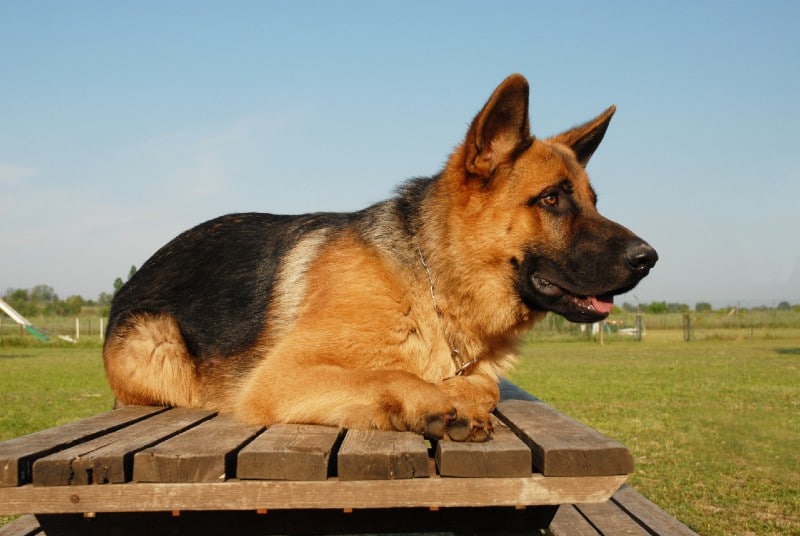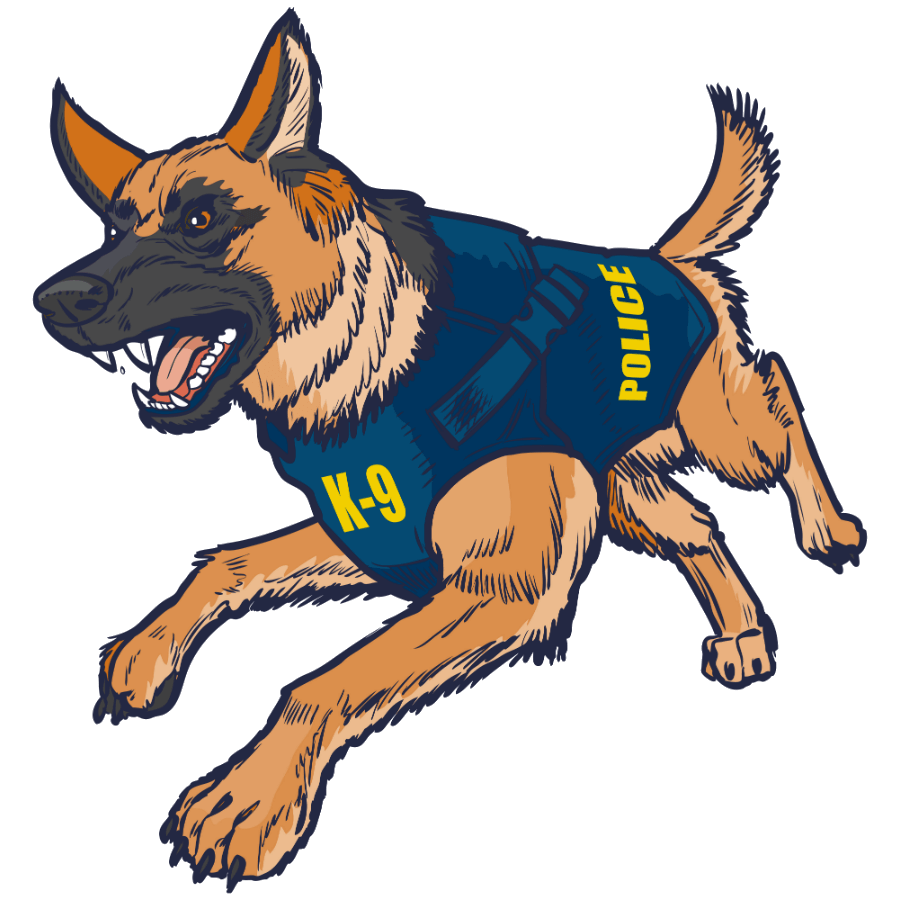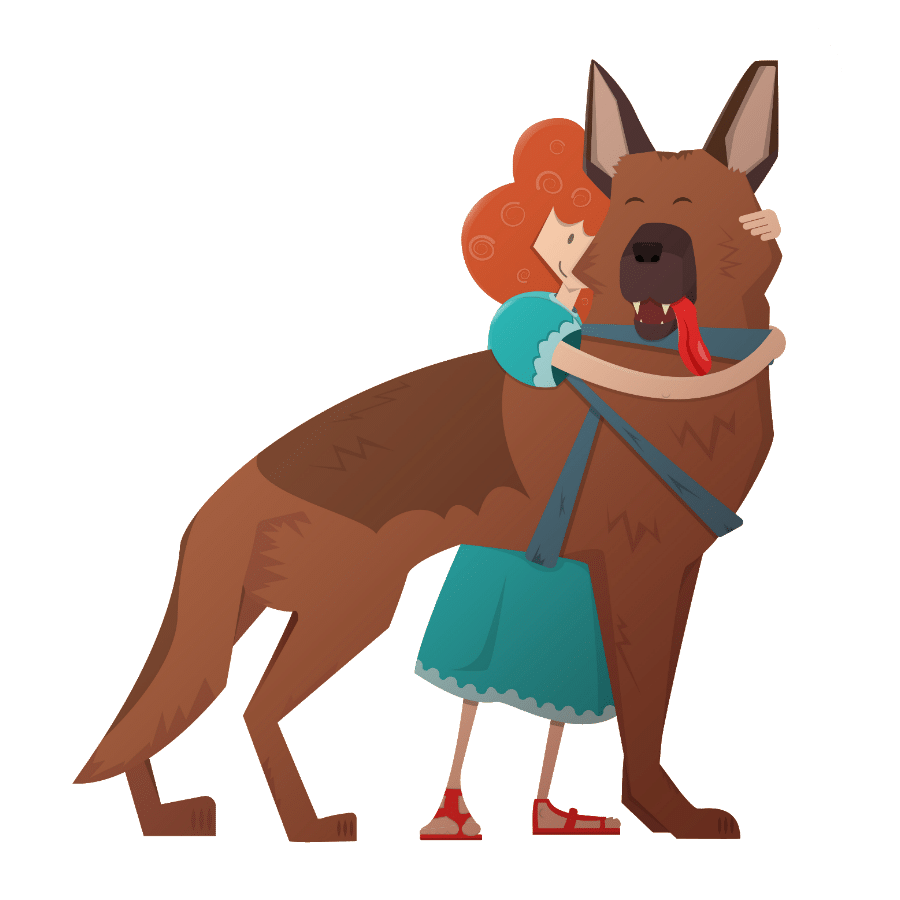German Shepherd temperament: One of the most recognizable breeds in the world, regardless of color, size, coat length and so on, must be the German Shepherd Dog (GSD). We know them from all kinds of media, whether books, photos, paintings, cartoons, movies, TV. To most people, the GSD image that immediately springs to mind is the guard dog. But these dogs were originally herding dogs, and have proven themselves in many other capacities. They are working dogs, companion dogs, as well as family pets. How can one dog fit into so many different situations? It is due to the very special temperament of the German Shepherd.
So, what is the German Shepherd temperament? Take all the positive aspects you would want from a dog, mix them up, flavor with outstanding intelligence and decorate with rare beauty and you have the GSD. Sounds a bit biased? Once you have owned one you will agree. As always, maltreatment and ignorance on how to deal with a dog breed can sour any dog’s personality but treat the GSD right and you have one of the best canines you can ever wish for. They are primarily known for being calm but wakey, bright, and full of character. It’s hard to be overenthusiastic but here is a list of the attributes that you will find in a well-bred, well brought up GSD:
- Alert
- Confident
- Courageous
- Curious
- Intelligent
- Loyal
- Obedient
- Watchful
Sounds good but are they not also supposed to be rabid killers, you may ask. Vicious brutes that attack and tear apart anything that moves? Ouch. No, they are not SUPPOSED to be like that. Even a Pomeranian can snap, bite, and attack anything that moves. Pity the poor dogs, regardless of breed, that are trained to be monsters. The German Shepherd is capable of being the sweetest, kindest, calmest, most caring dog that you can find. If that were not true, they would not be considered one of the top 10 breeds for therapy dogs, now would they?
Do German Shepherds Have a Good Temperament?
Yes, they do.
Temperament can be defined as a combination of mental, physical, and emotional traits. In the case of the German Shepherd, they are gentle, brave, warmhearted, courageous, and intelligent.
They can lie still and wait for you for hours and be off at the flick of a finger running like the wind. The German Shepherd is synonymous with trainability.
If you have the stamina and the mindfulness, they have the brain and the willingness. You can teach them almost anything, including how to behave around a variety of people – babies, kids, teenagers, adults, seniors, idiots, maniacs, couch potatoes.
8 German Shepherd Traits
Time to stop the raving and focus on a few traits that define the GSD breed in general. Dogs are just like people, they all have different personalities and characters. But some common streaks run through the breed as a whole.
Let’s look at the most important ones that you must expect when you acquire a German Shepherd.
1. Alert
Troll through the images of German Shepherd Dogs on the Web and nine out of 10 pictures will show them watching something, head high, ears straight up.

The best way to describe that attitude is “Alert”.
German Shepherd Dogs are always alert. Sometimes it looks like they are even alert while they are sleeping – those pointy ears never seem to rest!
The breeding history of the GSD resulted in a dog that is very aware of what is going on around him and even further away. Both as a herding dog and a guard dog, it was necessary for the dogs to be watchful at all times.
Sleepy Joes just did not make the grade. The selection for dogs that were alert went hand in hand with selection for other desirable traits as well. But expect the GSD to always know what’s happening.
2. Confident
Confidence may be a strange element of a dog’s temperament to consider. However, since the GSD is a working breed, it must be sure of itself in whatever activity or task it is required to undertake.

It is easy to understand why the dog must have confidence when it is a working dog, because the slightest hesitation may result in dire consequences. Imagine if a policeman is attacked by a criminal and his dog is unsure about what to do.
(It is also a good trait to have in a pet dog.)
If you boost your GSD’s confidence with consistent training, clear commands, praise when he gets it right, you will be rewarded with obedience but also unflinching action when it is necessary.
3. Courageous
If there is one thing that German Shepherds are especially well-known for it is their courage.

The annals of history are filled with records of German Shepherds that performed deeds of outstanding bravery.
Wartime dogs do heart-breaking stuff – military dogs as well, even if they are not in a war situation. The German Shepherd has featured prominently in the military since the First World War and it has not stopped. They function as messengers, sentries, scouts, mine detectors and rescue dogs.
German Shepherds are also courageous in everyday situations – fire, car accident, they even help other dogs.
And one famous one called Gabi fought off a Jaguar who had escaped from its cage in a zoo in Belgrade. Well, that’s not really an everyday situation but it’s not war either!
4. Curious
One of the more endearing traits you will find in the German Shepherd is curiosity.

These dogs are interested in anything new and unusual. They love to explore, sniff things out, check all the familiar places and people to make sure changes have not happened while they were busy elsewhere. Of course, they are also curious about other animals.
They tilt their heads and eye whatever interests them in a way that has become known as “the German Shepherd Head Tilt”.
The less anthropomorphic ones among us say it could be because they have ear problems, cannot see properly past their noses, or can not hear properly.
It does not make it any less cute especially if you speak to them and it looks like they want to say:
“Yeah? Really? How interesting! Tell me more!”
The puppies are especially nosy.
Shopping? Wow, something wild is hiding in those bags!
Cardboard box? Wow, another room to explore!
They also like to chew, so new things often get explored by giving it a good bite with their puppy teeth. Don’t scold them. Teach them what they can nose and what you do not want them to come near to. Curiosity is a sure sign of intelligence and alertness, do not repress it.
5. Intelligent
Curiosity and intelligence usually go together, and it’s the one trait that makes the German Shepherds such excellent working dogs.

There is some controversy about exactly how you measure canine intelligence. The method that is generally used is to just look up your breed on the Coren list (published in 1994). The German Shepherd comes in at number 3.
Coren identified various types of intelligence:
- Adaptive intelligence (i.e., figuring stuff out)
- Working intelligence (i.e. following orders)
- Instinctive intelligence (i.e. innate talent)
- Not to mention spatial intelligence, kinesthetic intelligence, interpersonal intelligence, and more 🙂
Unfortunately, the list he compiled was based mainly on the willingness and ability to learn and obey obedience commands, i.e. working intelligence.
To quote one person:
“If you do everything the teacher says, does that make you more intelligent?”
Whatever criteria you use, the GSD often behaves in a way that can only be described as intelligent by us, the general populace.
By the way, for a very interesting personal take on Coren and his research on dog/human relationships (whether the dog is intelligent or not) read the piece on pages 14 – 17 of the Trek magazine of winter/spring 2006.
6. Loyal
Another canine trait that humans appreciate a lot, particularly when it leads to courageous and brave behavior on the part of the dog, is loyalty.

GSDs are not born more loyal than other similar breeds, they are made that way (or not) by their owners. But, they do seem predisposed toward loyalty and most breed info sheets will list this as one of their traits.
What do we expect when we speak about a loyal dog?
One opinion is that loyalty means the dog loves you and your family more than other people. You know that because the dog is happy when you are there and sad when you leave.
Oh my. How do we prove any of these emotions in a being that does not speak human language?
One study did show that the levels of oxytocin rise when a dog looks at a beloved owner. In both the dog and the owner.
Oxytocin is known as the “love hormone”. It helps in forming and keeping a bond between people. This study shows that it also functions in the same way between people and dogs.
Subjectively speaking, a loyal dog does not leave its owner’s side, looks to his owner for approval, praise, instruction, and physical comfort, and defends him when it looks like he is threatened. Amongst others.
7. Obedient
Obedience is probably the reason why the GSD made it to number 3 of the Coren list.

With herding and working in its genes, together with a mind that we can easily identify with intelligence, a German Shepherd is just asking to be taught how to do things.
Therefore, German Shepherd obedience is second nature.
It just loves to show off how it can understand and follow instructions.
You can call it commands if you want to, but I think instructions is the better word. There are 20 basic obedience words or phrases and 9 advanced ones.
“Fetch!” is an advanced obedience command.
Really?
I thought that was one of the first things you teach a dog, but it turns out not.
The dog also learns with proper training that if it is not obedient and follows its own head that the outcome is not praise.
Praise must be used lavishly and you will get the cooperation that we translate into obedience. They do seem to know the difference between success and failure even if they are nor scolded.
The quarry got away or the jump was not cleared or whatever. They will try even harder next time.
8. Watchful
Watchful is the German Shepherd’s middle name.

It is a born watchdog.
There is a difference between a watchdog and a guard dog and you must know which is the one you want before you start training the dog.
Although both are classified as protection dogs, a guard dog will alert you to the presence of an intruder and attack it if necessary.
A watchdog will only alert you and not attack unless specifically commanded to do so. Even then it may not attack so be sure what you want it to do. German Shepherds are very well known as guard dogs, thanks in no small measure to the entertainment media who love to show them as snarling, attacking, vicious dogs.
But they are also recommended as one of the best family guard dogs and one of the best guard dogs for seniors. This is because they are trainable to either attack or not.
On this note, breeding is very important and you should know whether the dog you are getting was bred from show lines, working lines or a mix of the two to prevent later regrets, tears, and worse.
Watchdogs should notice anything unusual, not only intruders, and alert the owner. This is most commonly done by barking, but they may also come and look for you and indicate with their body language that you should come to look at something.
They are also sometimes called alarm dogs.
The above should alert you to the fact that any dog that is watchful and can bark loudly is a good candidate for a watchdog. As a result, some of the best watchdogs are small breeds like Dachshund and Toy Poodles.
The German Shepherd is a watchful dog who is not only curious but watches for threats and unfamiliarity. Add this to all of the above traits and you have a dog with a temperament that is complicated but as interesting to get to know as any human.
Related Questions
Yes they can be one of the best. Just keep in mind that they do need training and need to be accustomed to other animals, family members, and friends. And to BE a part of the family, they need to be TREATED like a part of the family. Capisce? Woof!
Yes. It depends on many things, like breeding, training, treatment at the hands of humans, health, age, boredom and even whether it’s too hot.